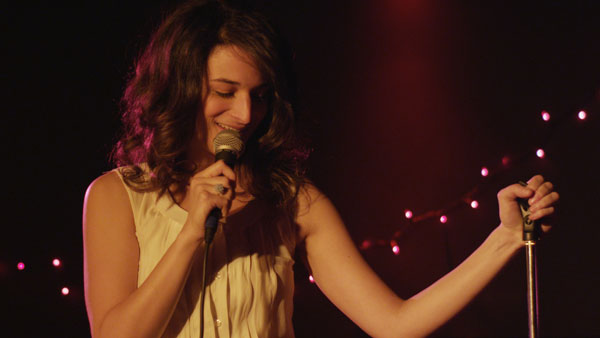Obvious Child Review
Obvious Child will always bear the distinction of being an “aborition movie” before a “romantic comedy” in the eyes of many because, well, movies about the termination of a woman’s pregnancy simply don’t get made in today’s risk-averse marketplace. It’s much easier to trot out Katherine Heigl and Gerard Butler and make viewers suffer through 90 minutes of painful physical hijinks before a happily-ever-after than let Jenny Slate and writer-director Gillian Robespierre get real for one second about the realities and responsibilities of a single woman stuck in a situation she’s unprepared to face.
That might be what makes Obvious Child such a breath of fresh air—that we haven’t really ever seen a movie quite like it. Under the surface, it really does follow the path well tread by generations of Heigls and Butlers, but it does so in service of something smarter, more honest, and far more important than the genre usually strives for. And while its flaws are obvious and a tad frustrating—conflict for the sake of conflict is never a good thing—its uniqueness and the gut-busting laughs Slate provides along the way make this one of 2014’s strongest narrative films so far.
So yes, the film is about an unplanned pregnancy. Donna (Slate) is an aspiring stand-up comedienne who’s just been dumped by her boyfriend. She spirals downward and on one particularly drunken night out, she meets Max (The Office‘s Jake Lacy). He farts in front of her while peeing in an alley, which is enough for her to go back to his place. But some condom shenanigans occur (Obvious Child leaves all that amusingly up in the air), and a few weeks later, Donna is visiting Planned Parenthood.
It’s hard not to admire the way Robespierre frames Donna’s abortion choice. It’s never really up for debate, and as such, the film plows through the moral/political quagmire you might expect it to get lost in. Instead, the film finds conflict in two places—one welcome, one not. There’s plenty of discussion about Donna’s responsibility to tell Max about her decision. He’s just present (and pleasant) enough in her life to make both sides (each argued respectfully and amusingly by Donna’s two best friends played very well by Gaby Hoffman and Gabe Liedman) understandable. Of course, Donna is free to do whatever she wants to her body and tell whomever she wants whatever she wants to do with her body. But the “pee farter” is sweet and seems to care—maybe you should tell him, Donna? The conversations are interesting and thought-provoking, but never too serious as to introduce jarring tonal shifts into the film.
Those shifts instead come in the form of David Cross—a hilarious actor, who’s just all wrong for this movie. It’s not just that his character and the things he’s asked to do are unfunny, but the romantic complications his character’s presence is supposed to add are cliched and unnecessary.
I haven’t gotten much into Jenny Slate’s performance. She’s great in the film, even if it isn’t the revelatory sort of work that will land her a plumb bio-pic role come December 2016. In other words, she’s a comedienne playing a comedienne, but that’s fine because she makes us care about and believe in the character of Donna.
But for better or worse, this film will ultimately be remembered for the choice at its core. In some ways, that’s frustrating because some will miss out on an insightful and very endearing piece of cinema as a result. In other ways, however, it’s a good thing. Obvious Child handles the issue of abortion maturely and progressively, and when smart conversations are being had about complicated and important issues (in a wildly entertaining way to boot), it’s hard to complain too much.

















One Response to Obvious Child Review